Key takeaways:
- Ocean conservation is essential for maintaining marine ecosystems and supporting coastal communities, highlighting our interconnectedness.
- Coral reefs, known as the “rainforests of the sea,” provide critical habitats, protect coastlines, and hold significant economic value.
- Threats such as climate change, pollution, and overfishing endanger coral reefs, emphasizing the need for immediate conservation efforts.
- Individual actions, community involvement, and advocacy play crucial roles in coral reef protection and raising awareness about their importance.
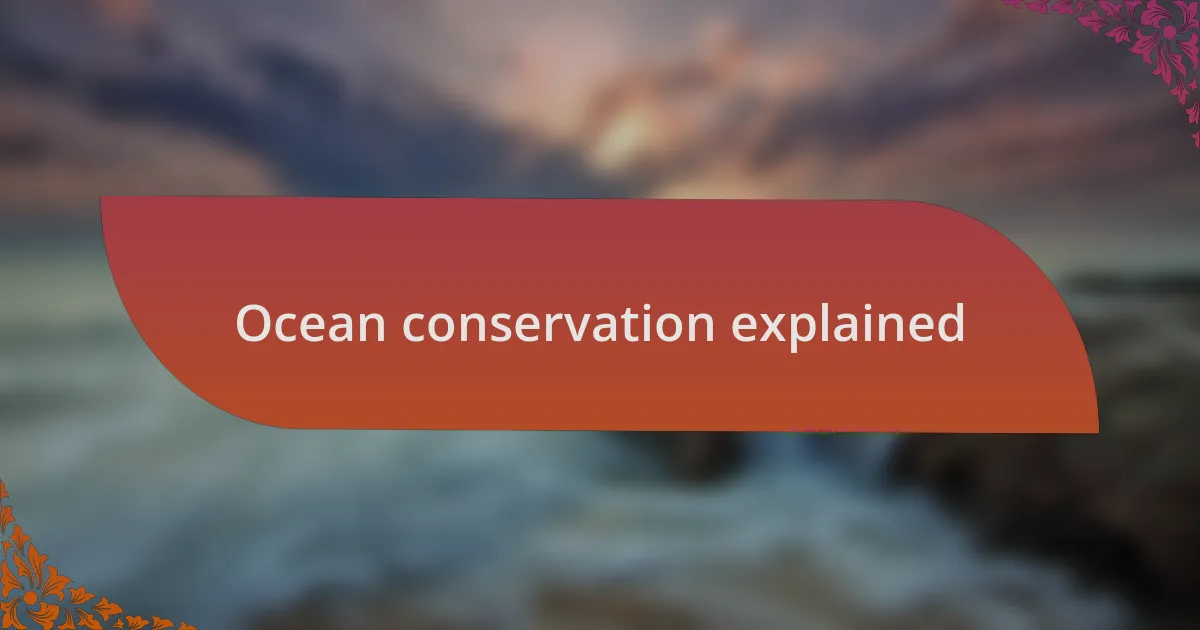
Ocean conservation explained
Ocean conservation is the practice of protecting and preserving the vast and vibrant ecosystems found beneath the waves. From reducing pollution to safeguarding marine life from overfishing, ocean conservation encompasses various efforts aimed at maintaining the health of our oceans. When I first learned about the critical role oceans play in regulating the Earth’s climate, I was struck by how interconnected everything truly is.
Every action we take can either harm or help the ocean. For instance, I vividly recall participating in a beach cleanup and feeling a profound sense of responsibility wash over me as I picked up plastic bottles that could strangle marine animals. Have you ever thought about the impact of a single piece of trash? It really makes you aware of how our everyday choices can either support or undermine ocean health.
Moreover, ocean conservation is not solely about the ocean itself; it also involves communities. I often think about coastal communities that rely on healthy oceans for their livelihoods. When we work to restore coral reefs, for example, we’re also helping fishermen thrive and preserving cultural practices rooted in marine ecosystems. Isn’t it fascinating how interconnected our lives are with the wellness of the ocean?
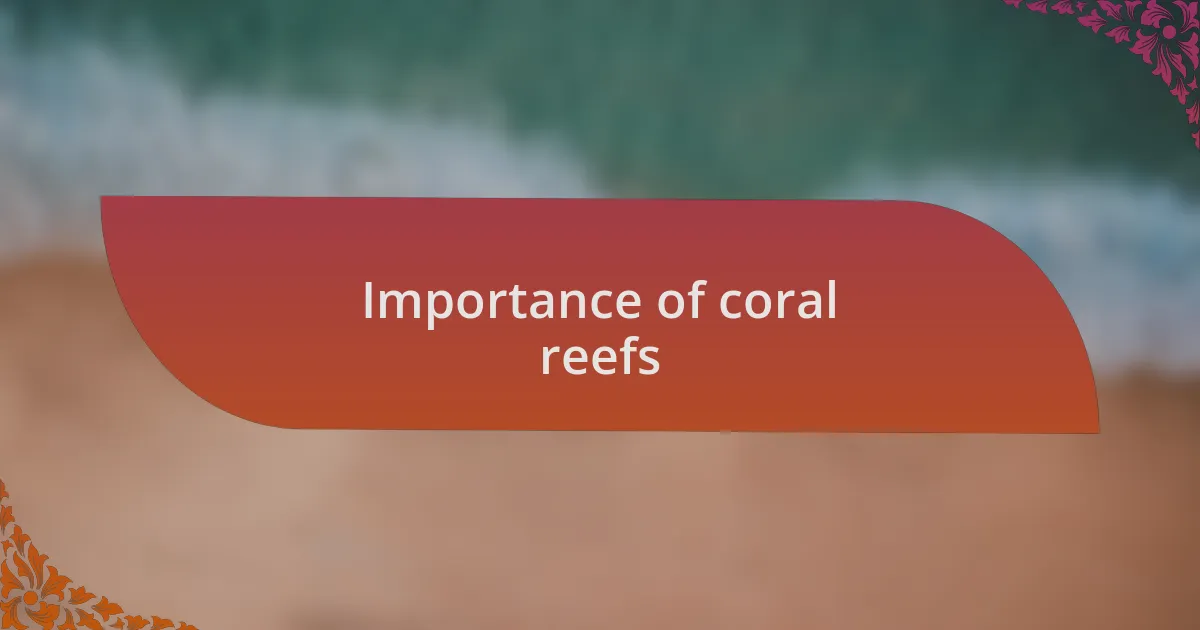
Importance of coral reefs
Coral reefs are often referred to as the “rainforests of the sea” for good reason. They provide habitat and shelter for nearly 25% of all marine species, which is remarkable considering they occupy just a small fraction of the ocean floor. I remember snorkeling over a vibrant reef, completely immersed in a world bustling with life. Have you ever experienced that? It’s a humbling reminder of how vital these ecosystems are, not only for marine life but for our own survival.
Additionally, coral reefs serve as natural barriers, protecting coastlines from erosion and strong storms. I’ve seen firsthand how communities in coastal areas benefit from these protective reefs. During one stormy season, I observed how a healthy reef shielded a nearby village from severe wave damage. It really drove home the point that when we protect coral reefs, we are also safeguarding human lives and livelihoods.
Finally, the economic value of coral reefs cannot be overstated. They contribute billions of dollars annually through tourism and fisheries. I once met a local dive shop owner who described how the health of the reef directly impacted his business. It made me think, how often do we undervalue what nature gives us? By investing in the conservation of coral reefs, we’re truly investing in our future, both environmentally and economically.
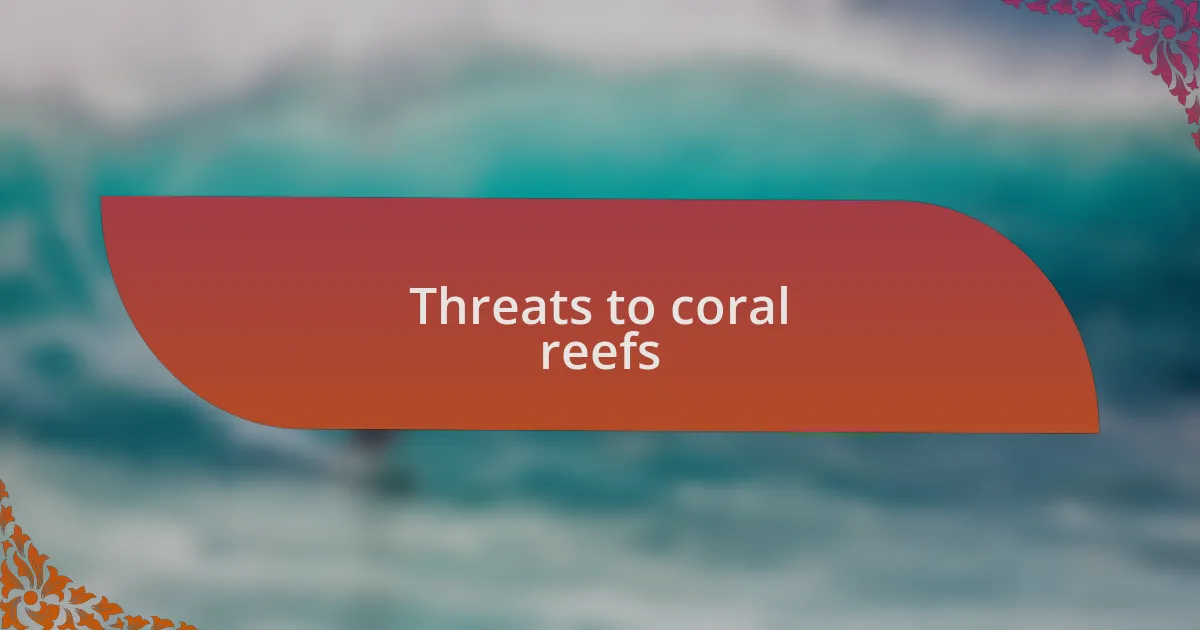
Threats to coral reefs
Coral reefs are facing alarming threats that put their existence in jeopardy. One of the most pressing issues is climate change, primarily caused by human activities. I’ve felt the rising water temperatures during my diving trips, and it’s devastating to witness the bleaching of corals, where vibrant colors fade to stark white. Have you ever seen a once-thriving reef transform into a desolate underwater landscape? It’s a heart-wrenching sight that compels us to act.
Pollution also plays a significant role in the decline of coral reefs. Urban runoff, plastic, and agricultural chemicals seep into our oceans, creating conditions that are detrimental to coral health. I recall a beach clean-up event where we collected not just plastic waste but also a shocking amount of chemical containers near the shore. It made me wonder: how often do we consider the impact our everyday actions have on these delicate ecosystems?
Overfishing is another critical threat that disrupts the balance of coral reef ecosystems. Unsustainable fishing practices deplete fish populations that are essential for maintaining reef health. I remember talking with fishermen about their changing catch sizes, and it was clear that the reef’s decline was affecting their livelihoods. Isn’t it fascinating—and alarming—how interconnected our world is? Protecting coral reefs means protecting not only marine life but also the communities that rely on them.
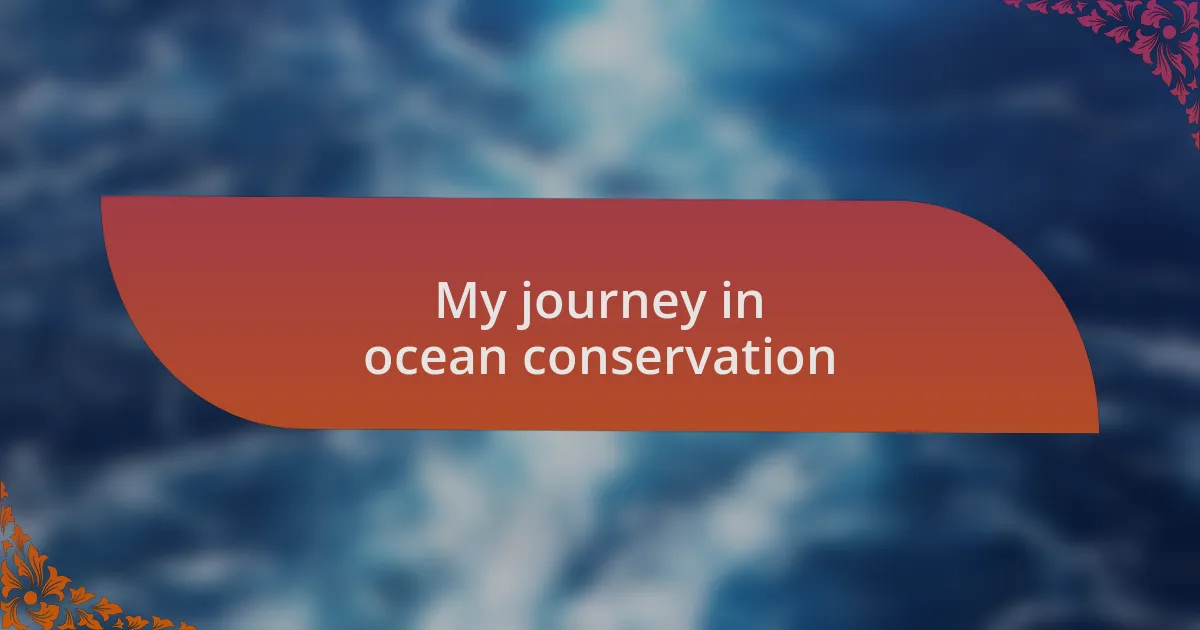
My journey in ocean conservation
My journey in ocean conservation began unexpectedly. A few years back, while snorkeling in a vibrant coral garden, I was utterly captivated by the kaleidoscope of colors and life around me. But that experience quickly shifted when I encountered a section of the reef devastated by bleaching. The stark contrast between the living and lifeless corals sparked a fire in me to learn more about coral protection. Have you ever felt that moment when beauty turned to urgency, pushing you to act?
As I delved deeper into ocean conservation, I sought out local organizations dedicated to coral reef restoration. Joining a program where we planted coral fragments was profoundly rewarding. I remember the first time I secured a tiny coral piece to a substrate, feeling a sense of responsibility wash over me. Could I really help give these corals a fighting chance? That question fueled my determination and forged strong connections with fellow conservationists who shared my passion.
Through workshops and community outreach, I learned the significance of education in protecting these ecosystems. One enlightening moment occurred during a presentation where I spoke about coral benefits, like providing habitats for fish. Seeing the spark of understanding in people’s eyes made me realize that spreading awareness is just as crucial as hands-on efforts. Isn’t it empowering to think that through education, we can inspire others to play their part in this vital cause?
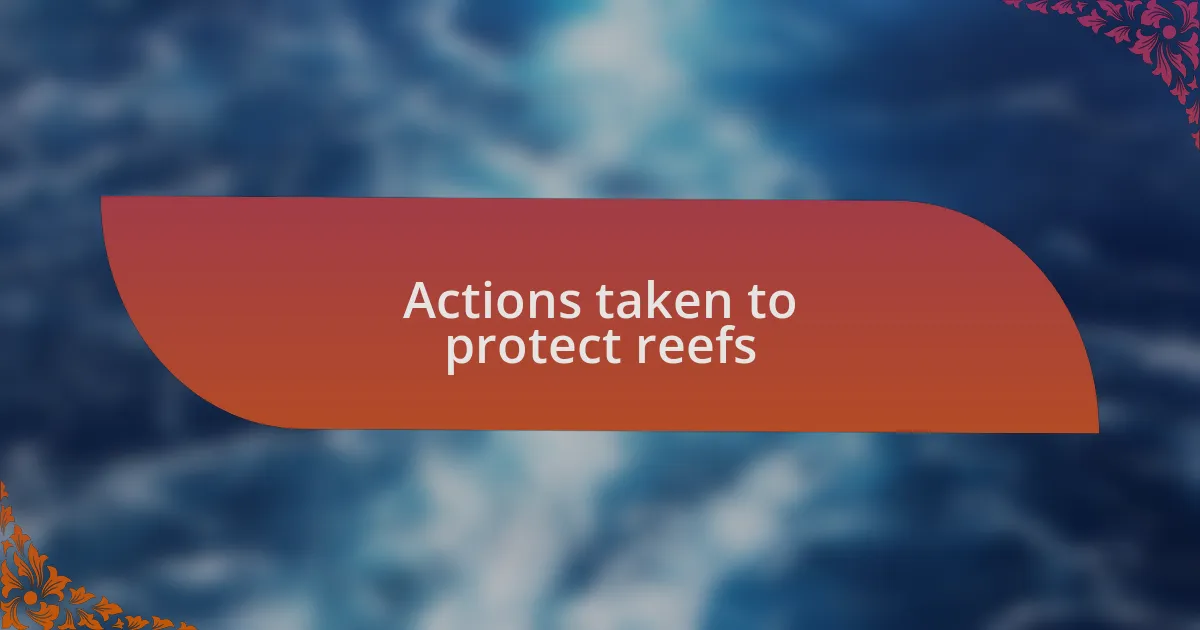
Actions taken to protect reefs
One of the most impactful actions I took to protect coral reefs was participating in beach clean-ups. It’s surprising how much debris, especially plastic, can accumulate and negatively affect marine ecosystems. The first time I picked up a discarded fishing net, I realized that this seemingly simple act could significantly reduce threats to the delicate balance of reef life. Doesn’t it make you wonder how small changes can lead to big results?
Collaborating with scientists on coral monitoring projects has also been instrumental in my journey. I vividly remember the first data collection trip after a storm. We surveyed the aftermath, taking notes on the impact on coral health. This hands-on experience not only deepened my appreciation for the challenges reefs face but also reinforced the importance of ongoing research in reef protection. Have you ever thought about how data can drive effective conservation strategies?
In addition to these activities, I actively advocated for stronger policies protecting marine areas. I can still picture standing at a local council meeting, passionately discussing the need for marine protected areas. It was both exhilarating and nerve-wracking, but knowing that my voice could influence policy changes motivated me to press on. Isn’t it remarkable how advocacy can empower us to create sustainable futures for these vibrant ecosystems?
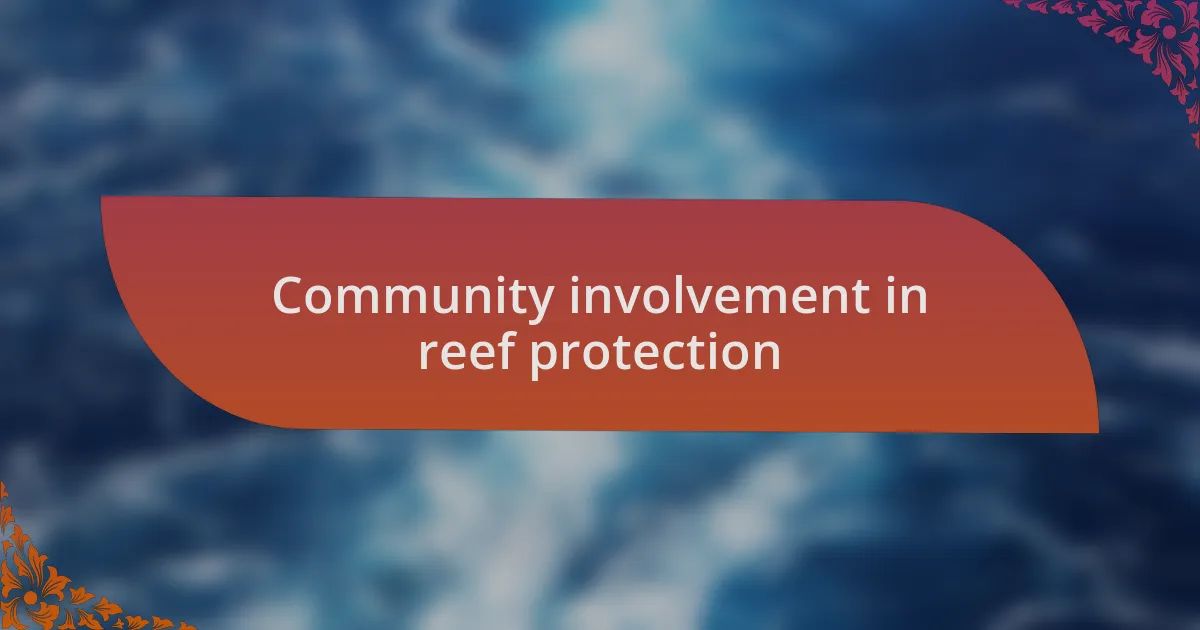
Community involvement in reef protection
Engaging the local community in reef protection has been a powerful experience for me. I recall organizing educational workshops where we shared knowledge about the importance of coral reefs. The excitement on people’s faces as they learned about the biodiversity that thrives beneath the waves was infectious. Have you ever witnessed a group transform their perspective on something they once overlooked? It’s moments like these that remind me of the potential we have to inspire change collectively.
One of my most memorable moments involved collaborating with local schools to create a reef protection mural. Children painted vibrant scenes of marine life, and as they worked, they enthusiastically shared what they had learned about coral ecosystems. This not only fostered a sense of ownership among the youth but also sparked important conversations about environmental stewardship in their families. It’s fascinating how art can bridge gaps and engage the community in dialogues about conservation. Don’t you think creative expressions can be pivotal in raising awareness?
I’ve also participated in community-led restoration projects where residents came together to transplant coral fragments onto degraded reefs. The sense of camaraderie and shared purpose was palpable. I remember the first time we placed coral in the water, feeling a wave of optimism wash over me. It was as if we were not just restoring reefs but also rekindling a connection to our oceans. How do you think community engagement can shape the future of reef conservation? I truly believe that when individuals unite for a common cause, the impact is immeasurable.
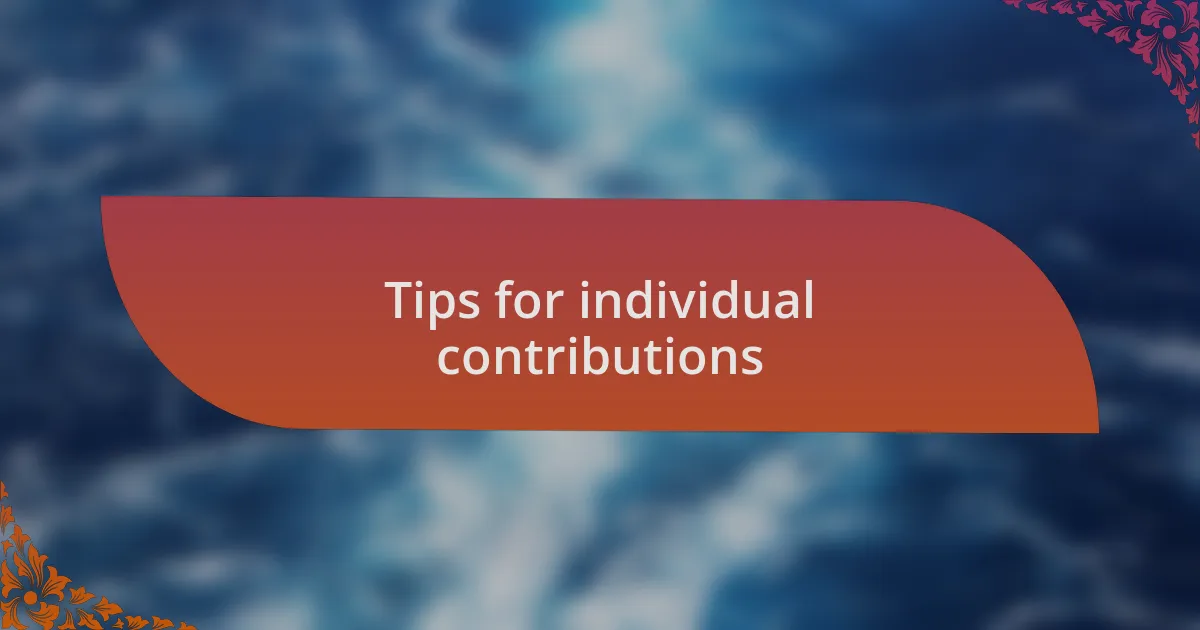
Tips for individual contributions
When it comes to protecting coral reefs, individual contributions can take many forms, each essential in its way. For instance, I began to reduce my plastic use after attending a beach cleanup event. Seeing firsthand how much plastic pollution affects marine life was eye-opening. Have you ever had a pivotal moment that made you rethink your habits? Making small changes, like using reusable bags and bottles, can significantly lessen the strain on our oceans.
Additionally, I started to advocate for sustainable seafood choices, which has become a passion of mine. I vividly recall sitting in a local restaurant, looking over the menu filled with various fish options, and feeling a sense of responsibility for what I ordered. The thought of supporting overfished species made me pause. By opting for sustainably sourced seafood, I not only enjoy my meals but also contribute to healthier ocean ecosystems. Have you considered what you’re putting on your plate?
Finally, don’t underestimate the power of spreading awareness through social media. I remember posting about coral reef threats and protective measures, and to my surprise, my friends began to engage with the content. People started sharing their experiences and ideas for conservation, creating a ripple effect of awareness. Isn’t it incredible how a simple post can spark conversations about something as crucial as coral reef preservation? Each of us can be a voice for the oceans.